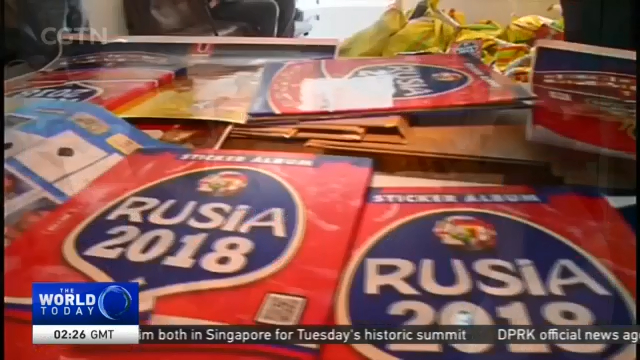
11:16, 11-Jun-2018
2018 FIFA World Cup: Album football craze picks up in Peru ahead of tournament
02:32

World cup fever is spreading and it's hit Peru hard. Many fans there have taken up the side sport of sticker collecting. Our correspondent Dan Collyns explains.
Collecting football cards has long been a passion for young fans of the sport, but with the World Cup around the corner, the collectible stickers and albums take on a whole new meaning, especially in countries like Peru where taking part in the international tournament is a novelty and a huge focus of national pride.
DAN COLLYNS LIMA "Swapping football cards is not just a hobby for schoolchildren, here it's a serious business. Some are supplying the demand for these coveted stickers by selling them, others are here to trade. Either way, everyone wants to fill their album before the World Cup starts."
Every afternoon parks like this are taken over by World Cup fever. For some fans - like student Juan Carlos - it's a way to get a little extra income.
JUAN CARLOS FOOTBALL STICKER SELLER "Everything started with collecting stickers, then I filled the album and I realized there was a business in this."
Players like Lionel Messi, Cristiano Ronaldo and Peruvian striker Paolo Guerrero are the most sought-after, he says, along with football legends like Pele and the national crests of the teams.
RENZO STICKER COLLECTOR "People were collecting stickers for the last World Cup in 2014 but this time around there are more because Peru is in the World Cup."
When they first came on sale, the albums - made by the Italian company Panini - sparked lines around the block. And there was tension and anger when retailers ran out of stock. The lucrative demand was not lost on fraudsters and police seized 20,000 fake albums worth some 350 thousand dollars last month.
SEGUNDO MEJIA PERUVIAN POLICE "There is high demand for the books and unfortunately these criminal groups are abusing people's good faith and trust not just domestically, but internationally as well."
While a packet of five cards sells for around 80 cents in the shops the price on the street can be. Most Peruvians weren't born the last time the country played in the World Cup, football fever has turned the business into a bonanza. Dan Collyns, CGTN, Lima.

SITEMAP
Copyright © 2018 CGTN. Beijing ICP prepared NO.16065310-3
Copyright © 2018 CGTN. Beijing ICP prepared NO.16065310-3